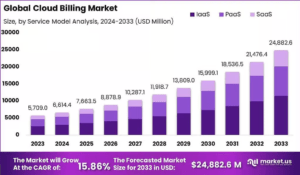Introduction
The Global Cloud Billing Market is undergoing significant expansion, driven by the accelerating adoption of cloud services across industries and the growing need for flexible, scalable billing solutions. According to recent data, the market was valued at USD 5,709.0 million in 2023 and is projected to reach approximately USD 24,882.6 million by 2033, reflecting a robust CAGR of 15.86% during the forecast period from 2024 to 2033.
This impressive growth is fueled by organizations seeking to streamline their billing processes, support diverse pricing models such as subscription and usage-based billing, and enhance operational efficiency in increasingly complex, multi-cloud environments. As digital transformation initiatives continue to reshape business operations worldwide, cloud billing platforms are becoming essential tools for ensuring accurate, real-time, and transparent financial management of cloud-based services.

Key Takeaways
- The global cloud billing market is projected to grow from $8.66 billion in 2024 to $9.79 billion in 2025 at a CAGR of 13.1%, and is expected to reach $20.59 billion by 2029 with a CAGR of 20.4%.
- Major growth drivers include the demand for cost efficiency, the rise of subscription-based and usage-based billing, and the need for unified billing systems in hybrid and multi-cloud environments.
- Retail, healthcare, and telecommunications are among the fastest-growing sectors adopting cloud billing solutions.
- Key trends shaping the market include the integration of AI for billing automation, blockchain for secure transactions, evolving pricing models, and increased collaboration between cloud service and billing providers.
- Real-time billing, compliance, and eco-friendly billing solutions are gaining traction as organizations focus on transparency and sustainability.
By Deployment Mode Analysis
Cloud billing solutions are primarily deployed via public and private cloud models, with public cloud deployment leading the market due to its scalability, lower upfront costs, and ease of integration with other cloud services. Public cloud billing is favored by small and medium-sized enterprises (SMEs) and rapidly growing businesses seeking flexibility and quick implementation. The public cloud model also supports multi-tenant architectures, making it suitable for organizations with diverse billing needs and global operations.
Private cloud deployment, while representing a smaller share, is growing at a higher CAGR as large enterprises and regulated industries prioritize data security, compliance, and control over sensitive billing information. The private cloud model is particularly attractive for sectors such as banking, healthcare, and government, where stringent regulatory requirements necessitate dedicated infrastructure. As security and compliance features in public cloud offerings continue to improve, hybrid deployment models are also emerging, allowing organizations to balance flexibility with control.
By Industry Analysis
The retail, healthcare, and telecommunications sectors are leading adopters of cloud billing solutions, driven by their complex billing requirements and the need for real-time, scalable systems. In retail, cloud billing enables businesses to manage dynamic pricing, loyalty programs, and omnichannel sales, while healthcare organizations leverage these solutions for patient billing, insurance claims, and regulatory compliance. The telecommunications industry relies on cloud billing to handle high transaction volumes, diverse pricing models, and bundled service offerings.
Other industries, such as BFSI (banking, financial services, and insurance), IT & telecom, and consumer goods, are also accelerating adoption as they undergo digital transformation and seek to improve customer experience. The flexibility of cloud billing platforms allows these industries to quickly launch new services, adapt to changing market demands, and ensure accurate, transparent billing for customers and partners.
Key Player Analysis
The cloud billing market is highly competitive, with leading technology vendors and cloud service providers driving innovation and market expansion. Major players include Amazon Web Services (AWS), Oracle, SAP, IBM, Microsoft, Salesforce, and Aria Systems, each offering comprehensive cloud billing platforms that support various billing types and deployment models. These companies are investing heavily in R&D to integrate AI, machine learning, and blockchain technologies, enhancing automation.
Top Market Leaders
- Zuora
- Amazon Web Services, Inc.,
- ConnectWise, LLC.
- Aria Systems, Inc.
- SAP SE
- Salesforce
- Cerillion
- BillingPlatform
- Recurly, Inc.
- Chargify LLC.
- Comarch
- Other key players
Conclusion
The Global Cloud Billing Market is poised for robust growth, fueled by the ongoing shift to cloud computing, the rise of subscription and usage-based business models, and the need for efficient, transparent billing systems. As organizations across industries embrace digital transformation and multi-cloud strategies, demand for scalable, secure, and real-time billing solutions will continue to surge. Technological advancements—particularly in AI, blockchain, and automation—are set to further enhance the capabilities of cloud billing platforms, positioning the market for sustained expansion through the end of the decade
The macro analyst desk brings highly sought after financial news based on market analysis, insider news and company filings.
